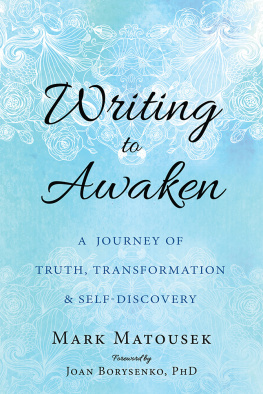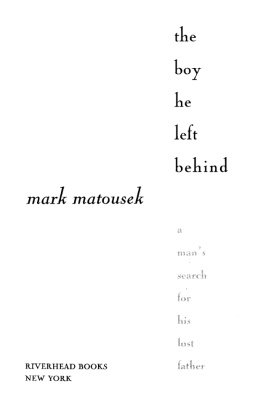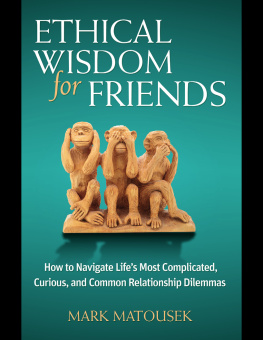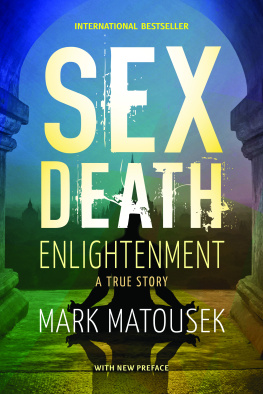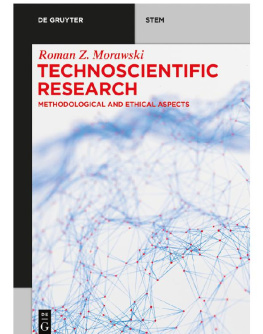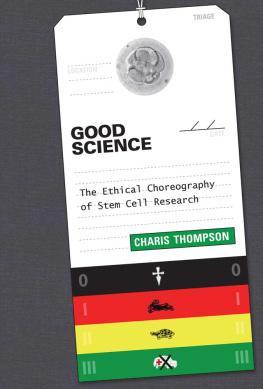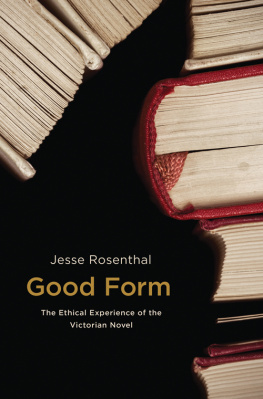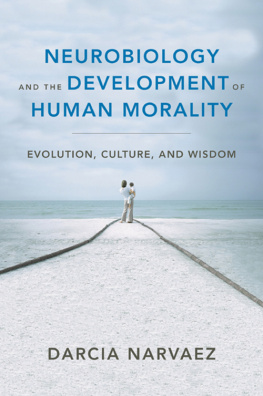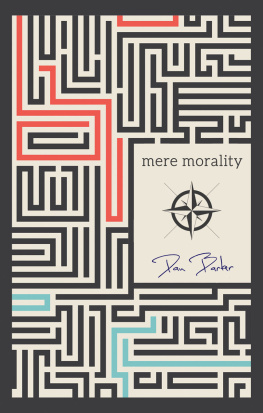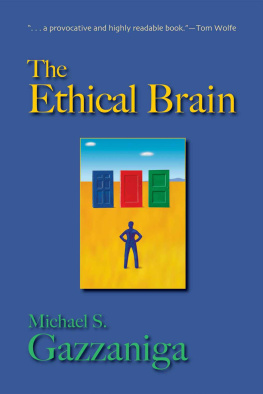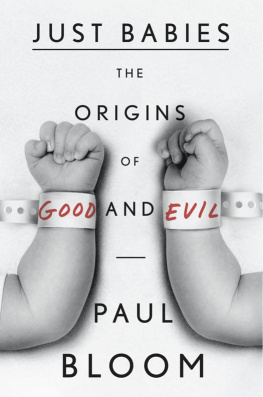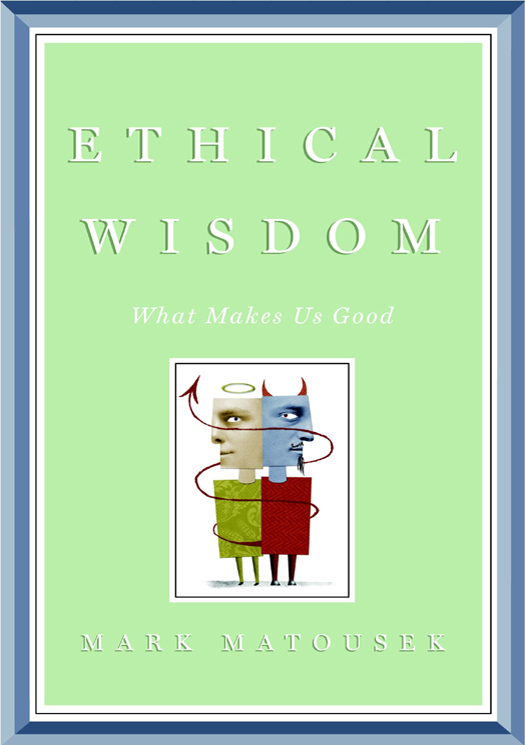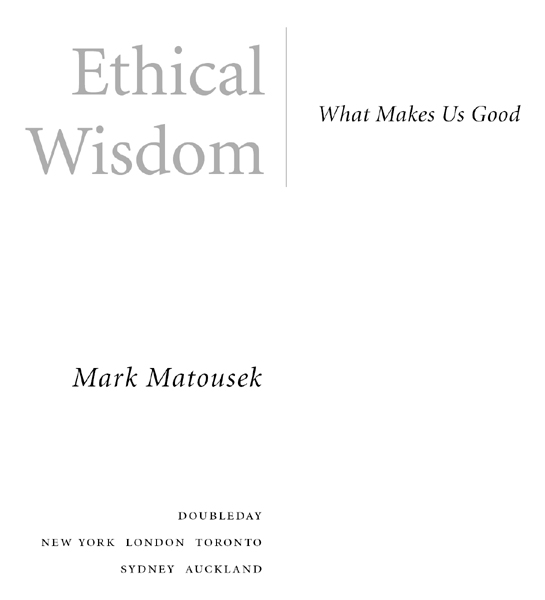ALSO BY MARK MATOUSEK
When Youre Falling, Dive
The Boy He Left Behind
Sex Death Enlightenment

Copyright 2011 by Mark Matousek
All rights reserved. Published in the United States by Doubleday, a division of Random House, Inc., New York, and in Canada by Random House of Canada Limited, Toronto.
www.doubleday.com
DOUBLEDAY and the portrayal of an anchor with a dolphin are registered trademarks of Random House, Inc.
Grateful acknowledgment is made to the following for permission to
reprint previously published material:
Basic Books: Excerpts from Evil: An Investigation by Lance Morrow, copyright 2004 by Lance Morrow. Reprinted by permission of Basic Books, a member of the Perseus Books Group.
Henry Holt and Company, LLC: Excerpts from The Anatomy of Human Destructiveness by Erich Fromm, copyright 1973 by Erich Fromm. Reprinted by permission of Henry Holt and Company,
LLC.
Jacket design by Michael J. Windsor
LIBRARY OF CONGRESS CATALOGING-IN-PUBLICATION DATA
Matousek, Mark.
Ethical wisdom : what makes us good / by Mark Matousek.1st ed.
p. cm.
1. Values. 2. Conduct of life. I. Title.
BF778.M38 2010
170dc22
2009031047
eISBN: 978-0-385-53260-0
v3.1
For Robert Levithan
Contents
Part One The Laugh That Preceded Philosophy
[HARM/CARE]
Part Two Suckers, Grudgers, and Cheaters
[JUSTICE/FAIRNESS]
Part Three Man Is Wolf to Man
[LOYALTY]
Part Four The Higher a Monkey Climbs, the More You Can See of Its Behind
[RESPECT/AUTHORITY]
Part Five How Ought I to Live?
[PURITY/SACREDNESS]
Morality, like art,
really does come
down to where
you draw the line.
OSCAR WILDE
Authors Note
I am deeply indebted to Professor Jonathan Haidt for introducing me to moral foundations theory. Also, as a literary tourist in the hybrid field of moral science, Ive relied gratefully on technical data provided by genuine scientists, social and neuroscientific, including Antonio Damasio, Erich Fromm, Dacher Keltner, E. O. Wilson, Frans de Waal, and Philip Zimbardo. Lance Morrows fascinating book, Evil: An Investigation, and Daniel Golemans hard science reporting (and conversation) also taught me a lot.
Introduction
M y mother wasnt always a thief. She wasnt really the criminal type. Rebellious, yesa crook, noat least not before my father left us. But very good people do bad things sometimes when their luck has run out and nobodys looking.
My deadbeat father skipped town without warning. The shame was worse than the poverty. This was back in the late 1950s, when broken homes werent common yet, making us pariahs, have-nots, desgraciados in our affluent L.A. suburb. My mother had struggled to keep us afloat but could not prevent the humiliation. She wept when the electric company cut our power. She cursed when we lost our car and the phone. She begged the landlord not to evict us when the welfare checks ran out and the five of us were eating matzoh breibasically, crackers and eggson paper plates by candlelight for dinner.
Ida, my mother, was losing it. When a neighbor offered her a job at Super Fair, a weirdly moral-sounding local department store, she jumped at the extra cash and began to work from 4 to 6 a.m., stocking shelves and pricing inventory. My mother slipped out before dawn every morning, while the four of us were still in bed. I can still recall the sound of the screen door slamming, and the strangeness of her new routine. I also remember my sisters becoming less snarky and bitter around that time. After the advent of Super Fair in our lives, mysterious gifts began to appear. Joyce was now wearing brand-new tennis shoes (I noticed because I certainly wasnt). Marcias battered old purse was replaced by a tangerine-colored item with tassels. Belle, my baby sister, now sported a festive pink snuggly, appliqud with clowns and balloons. And finallywith what appeared to be fishes-and-loaves magicianshipmy mother produced a navy blue coat like the one I had begged for on my birthday, but which was, she had said, beyond our means.
Where did it come from? I wanted to know.
Ida said it had been on layaway. Now I was positive that she was lying. We had lots of things on layawaystuff my mother had set aside in stores till she could mange to pay them off, which hadnt happened in quite a while. This coat had never been laid away. This realizationthe atrocious fact that my mother was lyingthrew a bombshell into my eight-year-old psyche and brought me to the first ethical crossroads of my life. Should I tell her that I knew she was pulling my leg? Or shut my mouth and enjoy the booty? Should I admit to my well-meaning mother that this moral betrayal had robbed me of parental trust? Or should I keep my mouth shut and just be grateful that she had tried to make me happy?
I thanked her for the coat and said nothing. My mother stopped working at Super Fair soon afterward and found a job as a civil servant. After that our family had more money; Idas thieving career had been flukish and brief. It was a flukishness that paid off in the end, though. My troubled conscience over that purloined coat helped to turn me into a lifelong seeker, someone who questioned truth obsessively. If my mother was a shoplifter what, for instance, did that make me? Could behavior actually be designated evil if it sprang from love? Was I a criminal for accepting her gift? Was it wrongeven sinful, perhapsto benefit from the fruits of a crime? Or did sin not even exist, technically speaking, when no one was around to report it? I felt arrogant, dirty, sorry, and grateful. I also felt deflowered. An ideal had been torn from my budding ethos, forcing me to acknowledge a conflict I was probably too young to face; namely, that the facts of a situation could lead to (at least) two different conclusions at the same time. My mother could be a wonderful person who did a cockamamie thing. I could be a thief for saying nothing. My sisters could be accomplices for loving their goodies. All of these things could be true at once. But how was this possible? It all got jumbled up inside me. Thinking about it made me feel sick. It also made me curious.
I became a compulsive seeker. Seekers are peculiar people. We always think theres some mind-blowing truth waiting right outside our field of vision. Were driven by the earnest belief that right, precise questions will open the doors of truth to us. Liberating secrets will be revealed. Seekers are sometimes delusional, but were also sincerely interested, and like most sincerely compulsive people, our drivenness can lead to wondrous discoveries. This childhood blue coat forced me to wondervigorouslyabout who I was and what constituted right and wrong; how opposite, simultaneous truths could be grokked. This made me reflect on the paradox that where opposites met, wisdom might, indeed, be born if a person learned to hold them in balance. This embracing of contradictory truths, without one canceling out the other, was said by the wise (whose books I began to devour) to be the essence of wisdom itself. My mother was both good and bad; I both loved her and disliked what shed done; I then repeated variations of her crime on a few occasions, and regretted it afterward. My sisters were co-conspirators who kept their feelings to themselves in the end. All of the things were true.


